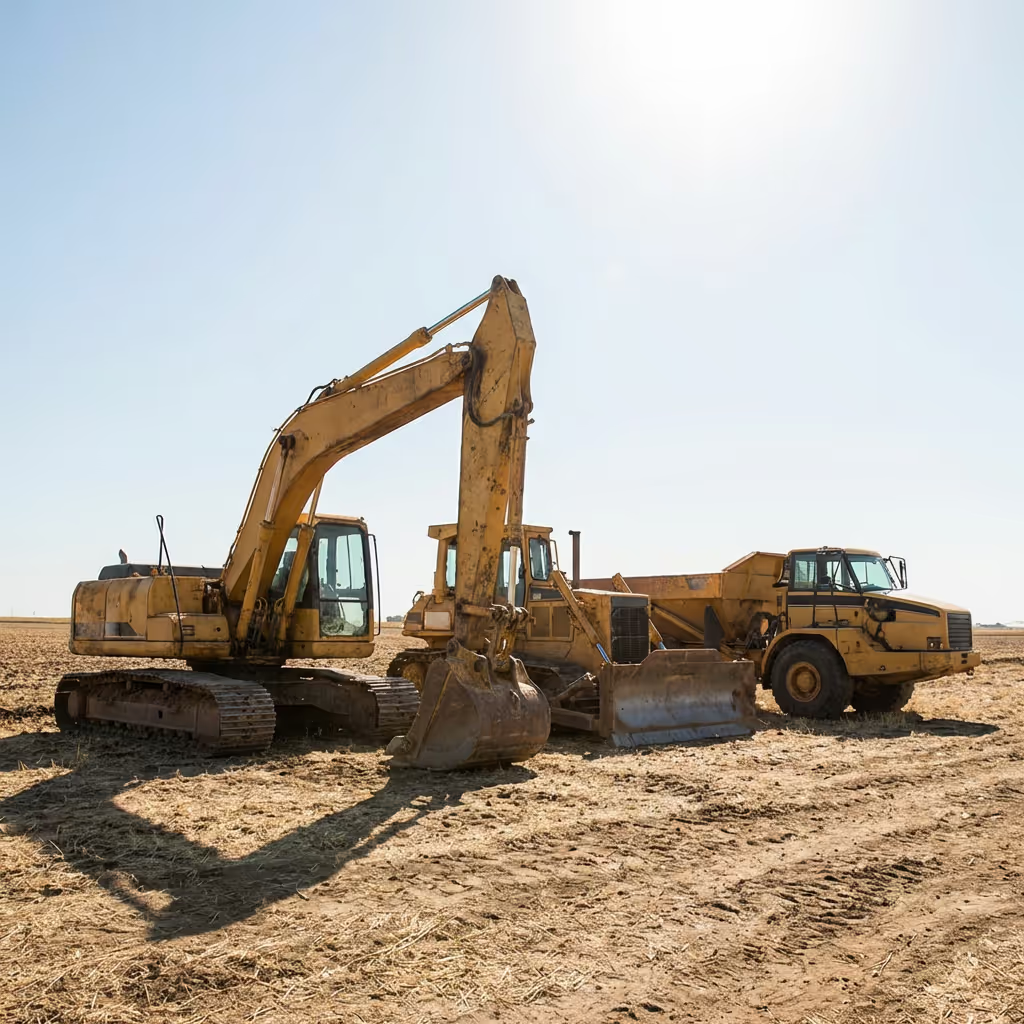Heavy Equipment Appraisal
Certified, USPAP-compliant heavy machinery and equipment appraisers for tax, legal, and financial reporting purposes.







Offered by world-class heavy equipment appraisers
About AppraiseItNow’s Heavy Equipment Appraisal Services
AppraiseItNow provides fast, fully online or onsite heavy equipment and machinery appraisals for legal, tax, financing, and financial reporting purposes. Our mission is to deliver defensible, USPAP-compliant valuations with exceptional speed, professionalism, and client service.
Our heavy equipment appraisers serve individuals, contractors, construction firms, industrial operators, and businesses that require independent valuations for IRS filings, asset-based lending, insurance coverage and claims, litigation, charitable contributions (IRS Form 8283), estate and gift tax reporting, bankruptcy, and transactional purposes. Many heavy equipment appraisals can be completed remotely, with onsite inspections coordinated when required by scope, equipment size, operating condition, or complexity.
Heavy Equipment We Appraise
We appraise a wide range of commercial, industrial, and individually owned heavy equipment, including:
- Excavators and mini excavators
- Bulldozers and crawler tractors
- Wheel loaders and track loaders
- Skid steers and compact track loaders
- Backhoes and trenching equipment
- Cranes and lifting equipment
- Motor graders and road construction equipment
- Compactors and paving equipment
- Forklifts and material handling equipment
- Mining and quarry equipment
- Attachments, implements, and specialty heavy machinery
- Multi-asset heavy equipment inventories
How Much Does a Heavy Equipment Appraisal Cost?
Our heavy equipment appraisal fees are transparent, scope-based, and designed to be fully USPAP-compliant for your intended use. We do not bill by the hour. A fixed fee is quoted in advance, so you know the cost before work begins. Pricing below is for informational purposes only; final fees are confirmed after reviewing asset details and scope.
Standard Heavy Equipment Appraisals — Starting at $295
- USPAP-compliant appraisal reports for standard purposes, including insurance coverage, internal planning, estate distribution, and probate matters
Advanced Heavy Equipment Appraisals — Starting at $395
- USPAP-compliant appraisal reports for advanced or compliance-driven purposes, including IRS filings, charitable contributions (IRS Form 8283), lending and asset-based financing, litigation support, bankruptcy, and transactional uses
Standard Fee Range
- Most heavy equipment appraisal projects fall between $695 – $2,200
- Pricing depends on equipment type, quantity, configuration, operating condition, and documentation quality
Pricing by Volume
For multiple heavy equipment assets, discounted aggregate pricing may apply:
- 1 item: $295 – $595
- Up to 10 items: $995 – $2,200
- 50+ items: $5,000 – $10,000+
What Affects Pricing
- Number of machines and variety of heavy equipment types
- Presence of specialized, high-horsepower, or custom-configured equipment
- Condition, age, hours of use, and remaining useful life
- Market liquidity and regional demand for the equipment
- Quality of available documentation (make/model, serial numbers, photos, service records)
- Intended use and related compliance requirements
- Whether an onsite inspection is required
Farm Machinery & Equipment valuations for commercial and personal clients

Servicing Commercial & Industrial Businesses
AppraiseItNow serves major businesses and commercial clients, including:
- Banks and lenders
- Construction companies
- Infrastructure contractors
- Inudstrial & manufacturing companies
- Internal finance teams
- CPAs
- Attorneys

Servicing Individuals & Households
AppraiseItNow also serves individual consumers with projects large and small. These clients often include:
- Heavy equipment & machinery owners or estate inheritors
- Individuals making non-cash charitable donations
- Couples going through marital divorce
- Families dealing with estate planning or post-death estate matters
- Individuals dealing with insurance or other third-party claims
- Individuals going through major financial or other life events
Written USPAP-compliant appraisal reports for when defensibility matters.
Given the USPAP-compliant nature of AppraiseItNow’s appraisal reports, we prepare our deliverables for major legal, tax, and financial reporting purposes for individual and commercial clients.
Popular uses of our appraisal reports include:
Tax, Estate & Financial Planning
- Capital gains tax
- Gift and estate tax
- Charitable donations
- IRA conversions
- Investment reporting
- Estate planning and probate
Transactions, Lending & Investment
- Loan collateral
- Purchase price allocation & cost segregation
- Mergers and acquisitions
- Investment analysis
Insurance & Risk Management
- Insurance coverage
- Insurance claims (Total Loss and Diminished Value)
- Third-party claims
Legal, Compliance & Reporting
- Bankruptcy filings
- Government purposes
Life Events & Special Circumstances
- Divorce
- Social Security reporting
- E-2 visa applications
Heavy Equipment & Machinery Appraisal – Frequently Asked Questions (FAQ)
What types of heavy equipment and machinery does AppraiseItNow appraise?
We appraise a broad range of heavy equipment and machinery used in construction, industrial, infrastructure, mining, and material-handling operations. This includes excavators, bulldozers, loaders, skid steers, backhoes, cranes, graders, compactors, paving equipment, forklifts, material handlers, mining equipment, industrial machinery, and related attachments and implements.
Are your heavy equipment and machinery appraisals USPAP-compliant?
Yes. All AppraiseItNow heavy equipment and machinery appraisals are prepared in full compliance with the Uniform Standards of Professional Appraisal Practice (USPAP) and are designed to withstand third-party review by the IRS, lenders, courts, auditors, and insurers.
What are common reasons someone needs a heavy equipment or machinery appraisal?
Clients commonly request heavy equipment and machinery appraisals for IRS filings, charitable contributions, estate and gift tax reporting, asset-based lending and refinancing, insurance coverage and claims, litigation and dispute resolution, divorce proceedings, bankruptcy, internal financial reporting, and business or asset transactions.
Can you appraise used machinery or equipment with high hours?
Yes. We regularly appraise used heavy equipment and machinery with high operating hours or visible wear. Hours of use, condition, maintenance history, market demand, and remaining useful life are all considered as part of the valuation.
Do you appraise construction, industrial, and mining machinery?
Yes. AppraiseItNow appraises construction machinery, industrial equipment, and mining machinery, including large-scale and specialized assets used in demanding operating environments.
Can you appraise complete equipment fleets or machinery inventories?
Yes. We provide aggregated valuations for full heavy equipment fleets and machinery inventories, including multi-location operations and mixed equipment sets. Volume-based pricing is available for larger portfolios.
Do you provide online or remote heavy equipment appraisals?
Yes. Many heavy equipment and machinery appraisals can be completed remotely using equipment lists, photos, serial numbers, hour-meter readings, and service records. When an onsite inspection is required due to equipment size, configuration, or intended use, we coordinate an in-person appraisal with a qualified local appraiser.
How much does a heavy equipment or machinery appraisal cost?
Fees are scope-based and quoted as a fixed price before work begins. Single-item heavy equipment and machinery appraisals typically start at $295, more complex or compliance-driven assignments start at $395, and most projects fall within a standard range of $695–$2,200, depending on equipment type, quantity, and complexity.
Do you offer discounted pricing for multiple pieces of equipment or machinery?
Yes. We offer volume-based pricing for multi-asset heavy equipment and machinery appraisals, including full fleets and large inventories. All pricing is confirmed in advance.
How long does a heavy equipment appraisal take?
Most heavy equipment and machinery appraisals are completed within 7–10 business days once all required information is received. Expedited turnaround options may be available for time-sensitive matters.
Who prepares the appraisal report?
Each appraisal is prepared by a credentialed appraiser with experience valuing heavy equipment and machinery, in accordance with USPAP standards.
Do you prepare appraisals for IRS Form 8283 (Noncash Charitable Contributions)?
Yes. AppraiseItNow prepares qualified, USPAP-compliant appraisals that meet IRS requirements for Form 8283 (Noncash Charitable Contributions) when heavy equipment or machinery is donated. Our reports are structured to support Section B filings and are commonly used by donors, CPAs, and tax advisors.
Do you buy, sell, broker, or finance heavy equipment or machinery?
No. AppraiseItNow is an independent appraisal firm. We do not buy, sell, broker, or finance heavy equipment or machinery, ensuring objective and defensible valuation conclusions.
What information do you need to get started?
Typically, we request an equipment list, make and model details, serial numbers, hour-meter readings, photos, condition information, service records, and the intended use of the appraisal. Clear documentation helps reduce both cost and turnaround time.
Can AppraiseItNow appraise heavy equipment located anywhere in the U.S.?
Yes. We provide nationwide coverage and can appraise heavy equipment and machinery located anywhere in the United States.
Will my appraisal be accepted by the IRS, lenders, or courts?
Our reports are prepared specifically to meet third-party scrutiny. While acceptance is ultimately determined by the reviewing authority, AppraiseItNow heavy equipment and machinery appraisals are routinely used for IRS filings, financing, litigation, and other compliance-driven purposes.

.avif)


